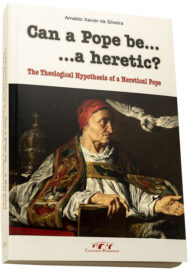
In a previous article,1 we showed the gravity of the sin of heresy and how an ambiguous teaching leads to heresy or already contains it. According to Saint Thomas Aquinas, the sin of heresy participates in the gravest of sins, the hatred of God,2 which “is chiefly a sin against the Holy Ghost.”3
We also showed how a heretic uses shades of ambiguity to deceive the faithful and dodge condemnation, and how it is necessary to unmask hidden heresy in ambiguous propositions. Since these can often have a good meaning, along with a bad one, to ascertain their true meaning, it is not enough to examine the words. It is also necessary to take into account the author’s acts, gestures, attitudes, and omissions. If these corroborate the bad meaning, one can legitimately conclude that it is the true meaning of the ambiguous statements.
10 Razones Por las Cuales el “Matrimonio” Homosexual es Dañino y tiene que Ser Desaprobado
Finally, we showed the fallacy in holding that an ambiguous heretic cannot be condemned by virtue of the juridical principle in dubio pro reo. Once the heresy underlying the ambiguous proposition has been exposed, its true erroneous meaning becomes clear and it is no longer a dubious proposition.4
In this article, we will present some theological and canonical consequences of the sin of heresy, and especially its incompatibility with ecclesiastical jurisdiction.
A. Recalling a Few Notions on Heresy
1. What Is “Heresy”
According to Canon 1325 of the 1917 Code of Canon Law, a heretic is one who, after having been baptized, and still claiming to be a Christian, denies or doubts pertinaciously a truth that must be believed by Divine and Catholic Faith.
According to Canon 751 of the 1983 Code, “Heresy is the obstinate denial or obstinate doubt after the reception of baptism of some truth which is to be believed by divine and Catholic faith.”5
2. The Canonical Delict of Heresy
Although it is a grave sin against Faith, internal (hidden) heresy does not produce canonical effects.
For espousing heresy to have legal effects, it must be expressed externally through words—orally or in writing—or by acts, gestures, attitudes, ambiguities or omissions.6
In this case, the heresy will be a canonical delict. The canonical delict can be notorious in two ways: through notoriety in law (after a trial and decision by a competent judge), or through notoriety in fact, if it is “publicly known and was committed under such circumstances that no clever evasion is possible and no legal opinion could excuse [the act].”7
3. Heresy and Loss of Ecclesiastical Office
The punishment for the delict of heresy is automatic excommunication (Canon 1364). For churchmen, in addition to excommunication, espousing heresy entails the loss of ecclesiastical office by law (Canon 194).
Prof. Juan Ignacio Arrieta,8 of the University of Navarra, comments that the action by competent authority referred to in the second paragraph of this canon,9 “is declarative and becomes necessary, not to cause a vacancy of the right to the office, but to juridically enable the person’s removal to be requested . . . and consequently, the installment of a new office holder.”10
In other words, the loss of ecclesiastical office is automatic. The declaration by competent authority is necessary simply to confirm that the office is vacant and may be filled by someone else.
4. Tacit Resignation: The Incompatibility Between Heresy and Ecclesiastical Jurisdiction
Canon 188 of the 1917 Code of Canon Law, affirms that espousing heresy constitutes tacit resignation: “Any office becomes vacant upon the fact and without any declaration by tacit resignation recognized by the law itself if a cleric: …. 4° Publicly defects from the Catholic faith.”11

According to Saint Robert Bellarmine, all the ancient Fathers teach that “manifest heretics lose immediately all jurisdiction.”12
Someone who has ceased being a member of the Church, because of manifest heresy, cannot enjoy any jurisdiction in it. Heresy and ecclesiastical jurisdiction are incompatible.
5. Pertinacity and Heresy
The above does not apply to a purely material heretic who falls into error out of ignorance or inadvertence. Instead, it is the lot of the pertinacious heretic, by which is meant one who adheres to an error contrary to the Faith or persistently doubts a truth of Faith with full knowledge and lucidity.13
In the theological-canonical sense, no advance warning or a long obstinacy in error is required to establish pertinacity.
Among others, this is the teaching of Adolphe Tanquerey (1854–1932): “For pertinacity to exist it is not necessary for the person to be warned several times and persevere in his obstinacy for a long time, but it suffices for him to deny, consciously and voluntarily [sciens et volens] his assent to a truth proposed in a sufficient way, whether he does so out of pride, from the pleasure of contradicting, or from any other cause.”14
Learn All About the Prophecies of Our Lady of Good Success About Our Times
Cardinal Juan de Lugo (d. 1660) explains the reason why warnings are not always needed to characterize pertinacity: “Also in the external forum, a previous admonition and reprimand is not always required to punish someone as heretical and pertinacious. . . . For if it can be ascertained in some other way, given the defendant’s qualities, obvious doctrinal knowledge and other circumstances, that he could not be unaware that his doctrine was opposed to the Church’s, by this very fact he will be considered a heretic. . . .”15
B. The Heretic Excludes Himself From the Church
In subscribing to heresy, the heretic excludes himself from the Church. As Saint Paul states, he is “condemned by his own judgment” (Tit. 3:10–11).
Saint Jerome comments on this text from Saint Paul saying: “Therefore it is said that the heretic has condemned himself; for the fornicator, the adulterer, the murderer and the other sinners are expelled from the Church by the priests; but the heretics pronounce sentence against themselves, excluding themselves from the Church spontaneously; this exclusion is their condemnation by their own conscience.”16
Saint Augustine comments along the same line: “Separate yourselves from the members of the Church, separate yourself from her Body. But why am I going to tell them to separate from the Church when they have already done so? In effect, they are heretics; they are already outside the Church.”17
Finally, Pope Pius XII affirms that no sin “of its own nature . . . severs a man from the Body of the Church as does schism or heresy or apostasy.”18
C. Conclusion
The heretic excludes himself from the Church, and no intervention is necessary on the part of the Authority. The heretic dictates his own condemnatory sentence.
The abandonment of the Catholic faith entails a tacit resignation of any ecclesiastical office, since those who are no longer part of the Church cannot enjoy jurisdiction in it.
The importance of this theological-canonical doctrine is not strictly academic. It is crucial in the study of the theological hypothesis of a heretic pope, as will be seen in a later article.
❮ Previous Article in this Series |
Next Article in this Series ❯ |
Footnotes
- Luiz S. Solimeo, “Ambiguity, Heresy, and Hatred of God,” TFP.org, May 31, 2019, https://tfp.org/ambiguity-heresy-and-hatred-of-god/.
- Saint Thomas Aquinas, Summa Theologica, II–II, q. 34, a. 2, ad 2.
- Ibid., II–II, q. 34, a. 2, corpus and answer ad 1.
- See Arnaldo Vidigal Xavier da Silveira, “Not Only Heresy Can Be Condemned by Ecclesiastical Authority,” in Can Documents of the Magisterium of the Church Contain Errors? Can the Catholic Faithful Resist Them? (Spring Grove, Penn.: The American Society for the Defense of Tradition, Family and Property, 2015).
- Unless otherwise indicated, the canons cited are from the 1983 Code of Canon Law.
- See Arnaldo Xavier da Silveira, “Acts, Gestures, Attitudes, and Omissions Can Characterize a Heretic,” Appendix to Xavier da Silveira, Can a Pope Be… a Heretic? The Theological Hypothesis of a Heretical Pope, trans. John Spann (Portugal: Caminhos Romanos, 2018), 191–221.
- Canon 2197. Edward N. Peters, cur. The 1917 Pio-Benedictine Code of Canon Law: In English Translation With Extensive Scholarly Apparatus (San Francisco: Ignatius Press, 2001).
- Most Rev. Juan Ignacio Arrieta Ochoa de Chinchetru has been secretary of the Pontifical Council for Legislative Texts since February 15, 2007.
- “§2 The removal mentioned in Canon 2 and 3 can be insisted upon only if it is established by a declaration of the competent authority.”
- Commentary by Dr. Juan Ignacio Arrieta, in Pedro Lombardia y Juan Ignacio Arrieta, Codigo de Derecho Canonico: Edición Anotada (Pamplona: Ediciones Universidad de Navarra, 1983, Canon 194. Unless otherwise noted, all translations from foreign sources and all emphases are our own.
- Peters, The 1917 Pio-Benedictine Code of Canon Law.
- Saint Robert Bellarmine, De Rom. Pont., lib. II, cap. 30, 420, quoted in Arnaldo Xavier da Silveira, Can a Pope Be…, 82. There is an English translation of Saint Bellarmine’s book by Ryan Grant, De Controversiis: On the Roman Pontiff (Charleston, S.C.: Mediatrix Press, 2015); also in Controversies of the Christian Faith, by Saint Robert Cardinal Bellarmine, S.J., Kenneth Baker, S.J., trans. (n.p.: Keep the Faith, Inc., 2016).
- See Canon 751.
- Adolphe-Alfred Tanquerey, Syn. Th. Mor. et Past., 2:473, quoted in Xavier da Silveira, Can a Pope Be…, 203.
- Juan de Lugo, Disput., 2: disp. 20, sect. 4, no. 157–8. See also Antonius Diana, Resolutiones Morales (Venice: Franc. Baba, 1635), par. 4, tract. 7, resol. 36; Vermeersch, Iuris Can., 3:245; Noldin, Compl. Poenis Eccl., 21; Regatillo, Inst. Iuris Can., 2:508, quoted in Xavier da Silveira, Can a Pope Be…, 205.
- Quoted in Xavier da Silveira, Can a Pope Be…, 85–6.
- Sermo 81, ML 38/981 quoted in Salaverri, De Ecclesia Christi, III, no. 1060, https://www.mercaba.org/TEOLOGIA/STE/iglesia/libro_3_cap_2.htm#Articulo%20III, accessed May 31, 2019.
- Pius XII, Encyclical Mystici Corporis Christi, no. 23, Jun. 29, 1943, http://w2.vatican.va/content/pius-xii/en/encyclicals/documents/hf_p-xii_enc_29061943_mystici-corporis-christi.html.
